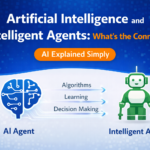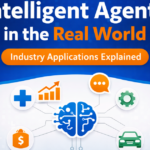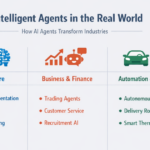The Conversation’s recent survey found that out of 32,000 employees, 58% use AI (artificial intelligence) intentionally to do their work. AI is rising fast, transforming industries and redefining roles at work. And the narrative is not AI vs humans or AI replacing employees anymore. It’s humans plus AI or the AI-augmented workforce- a blend of machine efficiency and human intelligence. This shift is forcing organizations to update their employees’ skills.
By improving your employees’ AI proficiency, you can transform your business with generative AI benefits. You’ll witness enhanced automation and productivity, content personalization, critical thinking, and innovation that allow you to thrive in a smarter, faster future. How do you upskill teams in the AI-augmented workforce era, though? In this post, we’ll discuss tips for upgrading teams expertise for the AI-augmented workplace.
Implement Effective Upskilling Programs
In a report by CIO, 74% of workers with limited AI literacy suggest employers are to blame for the skill gap. As a leader, it’s your duty to invest more in programs that will empower employees with essential skills to work with AI (use AI tech tools effectively). Online courses, training programs, and workshops provide the expertise workers need to collaborate with AI, for instance. Before investing in training programs, however, know why your team should upskill. Is it to improve efficiencies, elevate the customer experience, or foster innovations using AI?
This will help create a roadmap for proper implementation of skills upgrading and develop measurable success benchmarks. Then, provide targeted training that caters to different levels of AI familiarity in your industry. For example, offer basic training that boosts the foundational understanding of machine learning principles, AI-powered automation tools used in your industry, and natural language processing (NPL). Also, ensure advanced courses are available for teams directly involved with AI system management, as they require specialized knowledge.
Have Resources Readily Available
Throughout the upskilling initiative, teams require fast and safe access to hardware and software (apps) to train on new AI models and collaborate with peers. This calls for proper device and asset inventory management, especially laptops. Having an optimized laptop deployment system ensures each team member receives their laptop paired with other devices like AR and VR and configured with the right applications (generative AI models, virtual assistants, and chatbots).
This step reduces downtime, IT support requests, and device misplacement, ensuring companies reap higher ROIs on the employee training costs that range between $374,000 to $13 million.
When teams have access to devices and software, they can easily upskill using gamification and simulation activities. Gamified and simulated exercises teach through real-life scenarios and challenges, enabling trainees to think critically and solve problems. You could use AI itself to upskill your workforce. Think AI-enabled virtual assistants for personalized learning content and assessments.
AI chatbots offer feedback and mentorship to prepare employees for the augmented AI workplace. Other tools teams require are augmented reality (AR) and virtual reality (VR) for immersive simulations that keep trainees engaged in upskilling exercises.
Foster A Culture Of Continuous Learning
As AI technology continues to reshape industries, the importance of continuous learning can’t be ignored. Organizations whose employees engage in lifelong learning will have a competitive edge. Instead of onetime workshops, make continuous upskilling part of your organization’s DNA. Subscribe to learning platforms like Coursera and LinkedIn Learning, where workers can access ebooks and videos without limits.
Reward learning by giving awards: AI-specific certification, promotions, and bonuses to keep employees committed. Also, host internal AI bootcamps or labs for employees to practice or reinforce new skills. Be sure not to emphasize on data analysis and automation only. Train on skills AI can’t replicate, like critical thinking and creative problem solving.
Upskilling for the AI future isn’t about employee replacement, but unlocking the potential of AI and human collaboration (AI-augmented workforce). Businesses that upskill their talent now stand to thrive as AI becomes smarter and more integrated in the workplace. To upskill in the era of AI, organizations need to implement effective training programs, offer unlimited access to tools, and nurture lifelong learning.

Sandeep Kumar is the Founder & CEO of Aitude, a leading AI tools, research, and tutorial platform dedicated to empowering learners, researchers, and innovators. Under his leadership, Aitude has become a go-to resource for those seeking the latest in artificial intelligence, machine learning, computer vision, and development strategies.








